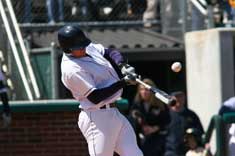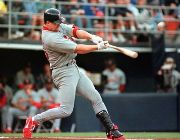
Batting Situation 3: The defense catches a baseball that has not bounced
 |
If a player (defensive, of course) catches a batted baseball that has never touched the ground, the batter is out. It doesn't matter whether it's in fair or foul territory: all the consequences and possibilities that follow are the same. (When a batted baseball has yet to touch anything but air, it's called a fly-ball.)
When the baseball is not caught before it bounces
Assume, on the other hand, that the baseball lands, bounces, or rolls anywhere on or off the playing field—the ground, the stands, the street, etc.—before any fielder can catch it. There are 2 possibilities:
Batting Situation 4: Foul ball is not caught before it bounces
If—because of the path it has taken—it's declared to be a foul-ball, then it's another kind of strike. This one is special. If the batter already has two strikes, this foul-strike does not count against him.
Why a foul-ball isn't allowed to be the third strike: at least he hit the ball somewhere. It's a failure on his part, but not as bad as failing to swing at an easy pitch (one type of strike) or swinging and missing (another type). Give the guy a break—don't call it the third strike, don't call him out, let's pretend nothing happened.
 |
Batting Situation 5: Fair ball is not caught before it bounces
If—because of the path it has taken—it turns out to be a fair-ball, the batter tries to advance around the bases while the fielders (i.e., the defense) try to intercept the baseball.
a) If the fair-ball first lands in the stands or beyond, it's a home run, the best thing a batter can do. He slows down to a trot as he completes the circuit of the bases, scoring a run when he leisurely touches home plate. This happens almost every game.
b) If the fair-ball bounces off the ground and goes into the stands, the batter is allowed to occupy second base, unhindered. This happens every two or three games. There is a time-out as a new baseball is given to the pitcher.
c) In the frequent case that a fair-ball stays within the confines of the playing field, there's a race: If the batter does not get to first base before the defense can get the baseball there, he makes an out.
Remember: we're talking about a fair ball that lands, bounces, or rolls before being caught. If the defense catches a fair or foul ball before it touches the ground, the batter is out
Maybe the baseball travels so far inside the park that the batter can run to second base, or third, or even to home plate (which would complete the circuit and score a run). He's welcome to try to run between those bases, but makes an out if the defense retrieves the baseball and touches him with it while he is not touching a base.



